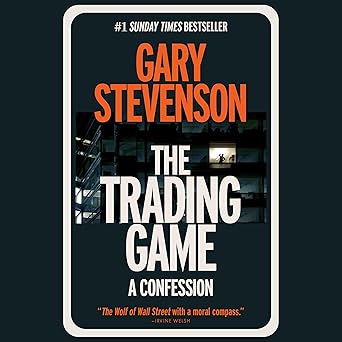
This memoir takes us inside the high-stakes drama of the trading floor, where the author, Gary Stevenson, rose from humble beginnings to become one of Citibank's most profitable traders. Growing up on the run-down streets of East London, Stevenson dreamed of something bigger, and his talent for numbers led him to win a competition called "The Trading Game" at the London School of Economics. The prize was a golden ticket to a new life, and Stevenson quickly became the youngest trader at Citibank, surrounded by dysfunctional geniuses and insecure bullies who eventually became like a dysfunctional family to him.
As Stevenson's success grew, so did the pressure and stress. He was making a killing betting on millions of people becoming poorer, which weighed heavily on his conscience. The economy was slipping off a precipice, and Stevenson's own sanity started to slip with it. He was trapped in a never-ending cycle of win or lose, with no clear escape. The lines between right and wrong began to blur, and Stevenson's ambition and curiosity took over, driving him to take risks that would eventually lead to his downfall. The author's writing is vivid and unvarnished, painting a darkly funny portrait of the trading floor, where the stakes are high and the players are often equally unscrupulous. Despite the risks, Stevenson's journey is an incredible story of the darker side of Wall Street, one that is both captivating and unsettling.
As we follow Stevenson's story, we are left with a sense of unease and uncertainty. Would he stick with the high-stakes game, even when it started to feel like losing? Or would he quit, risking everything? The author's decision has left him with nothing, but his story is a powerful cautionary tale about the dark side of ambition and the human cost of success. With its outrageous and unflinching portrayal of the trading floor, The Trading Game is a gripping and thought-provoking read that leaves the reader questioning the true cost of success.
I recently had the opportunity to read a memoir that takes me on a wild ride through the world of high-stakes trading. The author, a man named Gary Stevenson, recounts his journey from humble beginnings in East London to becoming one of the most profitable traders at Citibank. I couldn't help but feel a mix of emotions as I read about Stevenson's experiences, from the thrill of winning big to the crushing weight of losing everything.
As I turned the pages, I couldn't help but think about the human side of the story. The trading floor may seem like a place where only the strongest - or most ruthless - survive, but Stevenson's account reveals a more complex picture. He describes a culture of dysfunctional geniuses and insecure bullies, where the lines between right and wrong are constantly blurred. It's a world where the stakes are high, and the players are often equally unscrupulous. I found myself wondering how Stevenson could have endured such a toxic environment for so long, and whether he ever felt truly alone in his struggles.
What struck me most about the book, though, was its unflinching portrayal of the darker side of ambition. Stevenson's journey is both captivating and unsettling, as he navigates the treacherous waters of high-stakes trading with remarkable skill and bravery. At the same time, the book raises important questions about the human cost of success. What are we willing to compromise in pursuit of our ambitions? What do we risk losing when we let our pursuit of success cloud our judgment? These are the questions that linger long after you finish reading, and they made this memoir an unforgettable and thought-provoking experience.
Rating: 5.0 / 5.0
This memoir takes us inside the high-stakes drama of the trading floor, where the author's ambition led him to bet on millions of people becoming poorer. The author's talent for numbers won him a competition at the London School of Economics, leading to a life of making a killing at Citibank. However, the pressure and stress weighed heavily on his conscience, and he struggled with the ethics of his job. As his success grew, so did his risk-taking, driving him to take a path that would lead to his downfall. The author's writing is vivid, painting a darkly funny portrait of the trading floor, where the stakes are high and the players are often unscrupulous. The author's journey is a powerful cautionary tale about the human cost of success, leaving the reader with a sense of unease and uncertainty.